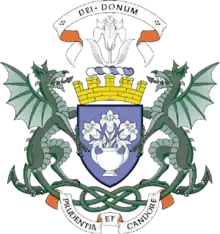The McManus
The McManus: Dundee's Art Gallery and Museum is a Gothic Revival-style building, located in the centre of Dundee, Scotland. The building houses a museum and art gallery with a collection of fine and decorative art as well as a natural history collection. It is protected as a Category A listed building.[1]
 | |
 Location in the City of Dundee | |
Former name | Albert Institute |
|---|---|
| Established | 1867 |
| Location | Dundee, Scotland |
| Coordinates | 56.462564°N 2.971156°W |
| Website | www.mcmanus.co.uk |
The concept for the building was originally commissioned as a memorial to Prince Albert and intended to contain room for lectures, museum, picture gallery and a reference library for students by the British Association for the Advancement of Science.[2] It was agreed that the funding for the building should be provided by the inhabitants of Dundee. Although the city could not afford such a lavish memorial outright, it did contribute £300. A guaranteed fund of £4,205 15/- from 168 contributors was collected, which included a large donation from the Baxter family that totalled £420.[2]
The building was designed by the architect George Gilbert Scott, who was an expert for the restoration of medieval churches and advocate of the Gothic architectural style. He intended to design a large tower like in his previous work at St. Nikolai, Hamburg. The foundations were situated in a small wetland called Quaw Bog at the confluence of the Scourin Burn and Friar Burn, which has since been drained. This meant that the area under the building site was underpinned by large wood beams. However, when construction began in 1865, the ground proved too unstable to support the larger tower that he envisaged. The building was opened as the Albert Institute in 1867.
Two further sections, which extended the building by four art galleries and four museum galleries, were added by 1889. The central section was designed to Scott's intention by David MacKenzie, with the Eastern Galleries by William Alexander. The contents of the Watt Institute, founded in 1848, were incorporated into the collection before the opening of the civic museum and art gallery in 1873. Between 1873 and 1949, the buildings were administrated as part of public library service. From 1959, the city corporation took over the running of the administration. Following a later refurbishment, the building now commemorates Maurice McManus, the Lord Provost from 1962 to 1967. Initially retitled McManus Galleries, after refurbishment in 2010, it is now formally known as The McManus: Dundee's Art Gallery and Museum.
.jpg.webp)
In 1976, cracks were discovered in south-east corner of the building. The subsequent survey found that the building was partially subsiding. During 1979, remedial measures involved placing load-bearing concrete piles and cross-beams positioned to replace rotted timbers.[3]
The building was closed to the public on 24 October 2005 for a £7.8-million redevelopment by Page\Park Architects and was reopened to the public on 28 February 2010.[4] Currently, much of the McManus collection, which includes works by Dundee-based artists James McIntosh Patrick and Alberto Morrocco, is located at the former Carnegie Library on Barrack Street.

The collection includes three paintings by Thomas Musgrave Joy which celebrate Grace Darling's rescue of passengers on the paddlesteamer Forfarshire.[5]
References
- Historic Environment Scotland. "Albert Square, Mcmanus Galleries, formerly Albert Institute, including lampstandards (Category A Listed Building) (LB24939)". Retrieved 26 March 2019.
- British Association for the Advancement of Science (1867). Meeting of the British Association for the Advancement of Science in Dundee, September 1867. OCLC 58887495.
- "Funds for remedial work at Albert Institute". Scotsman. 3 May 1979. p. 9.
- "Home". The Courier. Archived from the original on 29 February 2012. Retrieved 19 March 2017.
- Suzanne Fagence Cooper, ‘Joy, Thomas Musgrave (1812–1866)’, Oxford Dictionary of National Biography, Oxford University Press, 2004 accessed 5 Oct 2013
